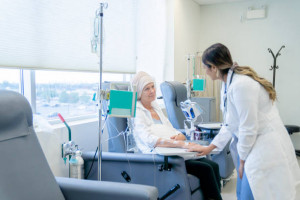
Iran is the best country for cancer treatment / Cancer treatment costs in Iran / Chemotherapy and radiotherapy in Iran / The best oncology and hematology specialists in Iran
What is cancer screening and how does it help you?
Cancer screening in Iran
Tests that can help diagnose cancer before symptoms begin are called cancer screening. When abnormal tissue or cancerous masses are found early and very quickly, they will be easier to treat and the chances of saving a person from a serious cancer complication will be minimized.
When cancer reaches a stage where its signs and symptoms appear, it means that it has reached a point where it has grown and spread throughout the body. At this stage, the treatment of cancer that has progressed a little will be more difficult and the chances of cure will be reduced.
In general, cancer screening methods include the following:
Physical examination and medical history: A physical examination of the body to check for general health symptoms, including symptoms such as bumps or anything unusual. This method also includes examining the person's history and history of behavioral habits, illnesses he or she has had before, and treatments he or she is undergoing.
Laboratory tests: This screening involves special medical procedures that test samples of tissue, blood, urine, or other body materials.
Imaging experiments: These are methods that image the body in different ways and with different tools.
Genetic testing: This method involves testing suspicious cells and tissues in special laboratories, during which specialists look for genetic changes or changes in various genes. These changes can be a sign of whether or not a person is at risk for a particular disease or complication.
Colonoscopy, sigmoidoscopy and stool tests
Numerous tests and screenings have shown that experience can reduce the chances of developing colon cancer. Colonoscopy and sigmoidoscopy can not only detect colorectal cancer at a very early stage, but can basically prevent the disease. This is because these tests can detect the growth of abnormal and suspicious masses in the gut (polyps) and remove them from the body before they become cancerous. Experts generally recommend that people with a moderate risk of developing colon cancer get tested regularly between the ages of 50 and 75.
Read more about Radiotherapy in Iran.
Mammography
This method of radiation imaging is used to check for breast cancer. Research has shown that mammography is one of the best breast cancer screening methods that can greatly reduce the chances of getting this cancer among women between the ages of 40 and 74. Performing this test regularly is especially useful and even necessary for women over the age of 50.
Pap smear and HPV test
These cancer screening tests, which can be done individually or in combination, can detect and prevent cervical cancer early. These tests prevent cancer of the cervix and cervix because they identify suspicious cells and tissues before they become cancerous. Experts usually recommend that Pap smears and HPV tests be performed on women between the ages of 21 and 65.
Other cancer screening
The use of screenings whose effectiveness has not yet been definitively recommended by physicians is also recommended. Especially in people who are at high risk and chance of developing various cancers. These lesser-known screening methods, while not as valid as the previous ones, can still be effective.
Read more about Everything about radiotherapy for cervical cancer in Iran.
Alpha-photoprotein blood test
This test is sometimes used in conjunction with a liver ultrasound imaging test, so that your doctor can detect any suspicious signs of cancer in people who are at high risk for developing the cancer very quickly.
Chest MRI
This test is often used for women who have a genetic mutation in the BRCA1 and BRCA2 genes. Women who have these genetic mutations are at higher risk for breast cancer. These genetic mutations can also increase the chances of other cancers in the body.
Read more about Mastectomy surgery for breast cancer treatment in Iran.
PSA test
The PSA test is actually a type of blood test that is often performed in addition to a digital rectal test. This test can detect prostate cancer in its early stages. Other experts do not recommend frequent PSA testing for many men, as the prostate cancers diagnosed with the test are often not fatal. Also, early detection and treatment of cancers diagnosed with PSA test did not reduce the chance of dying from prostate cancer.
Skin test
Doctors recommend that people who are at high risk for skin cancer have regular skin tests. However, it has not yet been proven that such tests can reduce the chance of dying from skin cancer. These tests may also cause overdose. However, people should be fully aware of their skin changes and report these changes to their specialist doctor.
Read more about Prostate cancer radiotherapy in Iran.
Ultrasound transvaginal test
This imaging test, which can take pictures of the internal organs of the uterus and ovaries in women, is suitable for women who are at high risk for ovarian cancer (people with dangerous genetic mutations BRCA1 and BRCA2). This test is also useful for people who have a high chance of developing endometrial cancer. However, it has not yet been proven that this test can reduce the chance of dying from any of these cancers.


